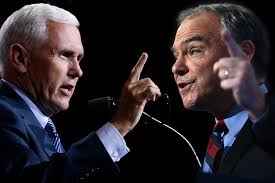The Vice Presidential Debate was not on everyone’s TV watch list on the night of October 4th. From the surface, the event consisted of arguments about issues from men who represent and defend their candidate’s opinions and ideas of policy who have a minor role in a presidential administration. Also, in past election cycles, the Vice Presidential Debate has not had a major effect on America’s choice on Election Day.
But if you want to hear from respectful debaters and moderators that focus more on discussing the obstacles our country currently faces and shy away from interruption and name-calling, then the VP debate might be interesting and important to you.
This presidential election is very nasty and superficial compared to past elections, so being able to actually hear policy from both sides of the spectrum is satisfying and enlightening. Also, the small chance these men will control the highest office of our land is extremely important. We must evaluate these candidates as Americans in order for our vote to be educated on the power it awards to these people. Also, if you did not watch this debate, then I advise you to please read on as I explain the general summary of both candidate’s opinions and plans on policy.
Now do not think that the VP debate was perfect in every regard just because they focused more on policy. Throughout the debate, false accusations were made, names were called, judgments were made, and generalizations frequently occurred. This is understandable though because a debate between democrats and republicans with an extreme amount of pressure and volatility involved between them should cause a few mistakes to be made.
The two contenders for the debate were Hillary Clinton’s running mate, Tim Kaine, and Donald Trump’s running mate, Mike Pence. Both were former governors who have had 15+ years of public servant experience. This debate contained both arguing and interruption, but mostly contained opinions on policy. So, I am going to address the highlights of each VP’s opinions on questions regarding the candidate they are representing, not their opinions of the opponent.
At the beginning of the debate, presidential leadership and trust were the main ideas of the questions asked. Tim Kaine explained that Hillary Clinton and he can be trusted about their temperament and skills in times of tragedy. When the distrust of Hillary’s emails and the Clinton Foundation were brought up, Kaine explained that her passion to be a public servant shows she can be trusted to do what the people ask of her in a trustworthy way. Mike Pence defended claims of Trump’s risky and erratic behavior questioned by the moderator, Elaine Quijano, by stating Trump has a vastly diverse business acumen and created an empire that employed thousands of people, showing that Trump can be trusted as a leader over people.
Quijano then posed the statement that the tax plans of both candidates will increase the national debt, and asked how both VP’s and their candidates will deal with the national debt. Pence responded that Indiana, the state he governed, is doing great economically, and that Trump wants to lower taxes across the board, repeal Obamacare and other executive orders that stifle the economy, strike good trade deals that favor the US, and generally meet the needs of the nation while also bringing down the debt.
Kaine responded with a description of Hillary’s “You’re Hired” plan, which included investing in manufacturing and research for clean energy, investing in the workforce, raising the minimum wage, investing in small business growth, and lowering taxes for middle class families and small businesses.
Involving the topic of police brutality, Pence said we ask too much of police officers and cops are the best of us. They should be treated with respect and should have the resources enabling them to instill law and order. He also disagrees with the presence of institutional racism in our police force.
Kaine says we should build bonds of understanding between police and people. This involves instilling trust, employing mental health reform, and regulating guns and the ease of obtaining one.
When the topic of immigration was brought up, Pence stated Trump will end illegal immigration and enforce immigration laws, while also acknowledging the National Border Control Council endorsed Trump and his ideas on immigration.
Kaine said immigration needs comprehensive reform that involves a bi-partisan agreement, while also controlling the border. He also said the Clinton Administration wouldn’t rip apart families that include illegal immigrants.
Regarding the topic of ISIS, Kaine explained that Clinton would take out ISIS by terminating their leaders, disrupting their financing networks, disrupting online recruiting, and working with allies in the Middle East.
Pence then explained Trump’s plan against terrorism at home begins with suspending the Syrian Refugee Program and generally airing on the safety of the American people.
In the breakdown of foreign policy, Pence states Trump will show the strength the US needs and will not let any country, especially Russia, walk all over the US.
Kaine explained Clinton can handle Russia and will be harder on them about their actions in Syria and Crimea. They both had similar opinions on an aggressive stance towards Kim Jong Un and that if North Korea had the opportunity to nuke the US, then the US should take some sort of action.
Towards the end of the debate, the social issues of abortion and the death penalty were brought up. Both candidates pride themselves on their religion and how it makes up who they are, but both have very different views on how their faith is involved in their political opinions.
Kaine is personally against the death penalty, but Virginia, the state he has governed, was strongly for the death penalty and he had to listen to the people he represented and compromise with their ideas. He said he trusts women with the right to abortion and believes public servants do not have to dictate people’s lives and their decisions.
Pence disagreed with Kaine’s ideas of faith and politics, explaining his faith has shown him the sanctity of life. He is against abortion and is for non-abortion alternatives such as child adoption. He generally thinks that faith is a part of what makes a person who they are, and that this bleeds into their opinions on policy.
The last topic of the debate was the unification of the country. Kaine claimed Hillary has consistently unified and compromised in the past, and he himself compromises and wants to work with the Republican Party.
Pence stated the country is dealing with challenging times, and that Trump will bring people together through change. He also believes the potential for a better America is there and all it takes is some leadership by Trump to realize it. He wants to rebuild the world with the US on top and successful.
Now these highlights of the debate did not address the behavior and respect each candidate showed. In my opinion, it seemed that Pence was calm and collected, but dodged many questions regarding Trump’s mistakes and comments.
Kaine, on the other hand, was impatient and interrupted multiple times, but came to the debate with an easier presidential candidate to defend.
I think Pence won because of a calm, patient performances are so rare in this political age, but I still think that Kaine called Pence out on his lack of defense for Trump gracefully.
If you are interested in discussing or becoming more educated on these debates, the election cycle, or just politics and the significance of these issues, then stop by the Jesuit Political Society meetings, which are held every Thursday in B111 during 6th period.
Politics have an extreme effect on every American’s daily activities. They involve our safety, money, freedom, and core values- all aspects of American life that we truly care about. It is even more important in this election, an election of unprecedented pressure, disagreement, anger, and impact on America’s direction.
As Jesuit students, we have the amazing opportunity to achieve a higher education and lead our generation that is now lacking in political efficacy. I ask you to be counter-cultural and immerse yourself into the ideas and policy that will shape the great country we live in. I strongly encourage you to join the Political Society and lead your Jesuit brothers, your community, and your nation to hope and prosperity.






